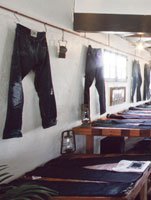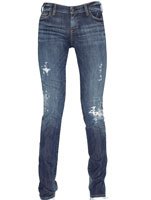Premium Denim Designers Maneuver for New Reality in '09
After years of robust growth, skyrocketing price tags and seemingly endless hoards of hot new brands, premium denim has stalled. Pushed by the weight of its own teeming ranks and the recession that is gripping the country, premium denim has gone from must-have fashion to something much more tenuous.
Los Angeles’ premium denim houses are repositioning themselves to adapt to the shift in business.
A recent report by Koncept Analytics put the value of the worldwide premium-denim market at $4 billion but said sales of the pricy jeans in the United States have fallen and are expected to slide in the coming years. Industry sources say orders for premium denim are down significantly, especially in Japanese fabrics, as the yen continues to strengthen. Textile mills producing the specialty fabric are having trouble selling premium denim, and dropping demand is having the effect of depressing the fabric’s price. Trade shows once heavy with indigo are turning to other categories to fill their booths, retailers that were once eager to stock the hot new brands are turning back to old faithfuls with infrastructures big enough to ensure flexible terms and on-time deliveries, wash houses once humming with designers playing mad scientists are quiet, and brands that were once shamelessly marketing $400 to $1,000 jeans are repositioning themselves to cope with the new reality.
“The bubble has burst. We had a good run, but now those days are finished,” said premium-denim veteran Stefano Aldighieri, a former creative director of Hudson Jeans, Seven For All Mankind and Levi Strauss & Co. and founder of Los Angeles–based design firm Another Design Studio. “This year, a lot of brands will fade away, go out with a bang or change to do something different. It’s a different time, but that’s not necessarily a bad thing.”
The challenges are large, but far from conceding defeat, makers of premium denim are finding a variety of ways to keep their doors open and their jeans selling.
“The market today is still giving room to the good products,” said Adriano Goldschmied, designer of GoldSign and an elder statesman of the premium-denim industry. “But [the market] is totally rejecting the ones that are not qualified and that were there just taking advantage of the premium trend.” Those brands that are competitive in the creative, operational and financial areas, he said, have a bright future.
Michael Ball, founder of Culver City, Calif.–based Rock & Republic, has taken the tack of launching a brand named for the economic downturn that made its creation a necessity. Recession, a new line for men and women, will launch for Spring 2009 with a lower price point. Rock & Republic, which built its brand on a vibe of rock-star excess, has also dropped the price of some of its most expensive jeans from more than $300 to no more than $280 retail. “Obviously, a lower price point is attractive. We did what makes sense, what will drive business. It’s our own stimulus package,” Ball said. The Recession collection, which will sell alongside Rock & Republic’s core offerings in specialty stores and top-tier department stores, includes two silhouettes each for men and women and simple T-shirts. Ball said the brand will continue to cultivate its exclusive air, despite the introduction of a lower price point, by offering limited-edition cuts of Recession jeans.
Ball has also done some reorganization of his staff to cut costs and position Rock & Republic for the future he envisions for the brand. In addition to trimming its operational staff, the company “got rid of our high-priced, prima-donna designers,” Ball said, referring to the previous design team that he built of recruits from high-fashion design houses. For Fall 2009, Rock & Republic will debut a collection Ball calls his opus. A back-to-basics approach, the collection will be heavy on denim and spiked with fashion, including leather jackets and complementary contemporary apparel. The brand has also trimmed its offerings from 680 SKUs to 220. “Before, we had the luxury of creating things and experimenting with things that might not sell. Now, there is no time for that. There has to be a reason for everything we do,” Ball said. To that end, the brand has also streamlined its accessories offerings, cutting out handbags but keeping its shoe line.
Elena Picket, Joe’s Jeans’ senior vice president of sales, said premium denim has become a mainstay that isn’t in danger of extinction. But, like Rock & Republic, Joe’s is using price and product to keep its market share. “Our customer is very fit-conscious, and we have a very strong five-pocket business,” Picket said. In 2008, the brand sold 1.1 million units. To keep that business in 2009, Joe’s has added two new price tiers. “In December, we layered on a $138 opening–price point jean in two fits for women and one fit for men,” she said. The lower price point is targeted at the brand’s existing retailer base, not a lower tier. A second price point was added at the top of Joe’s range, kicking retail prices well over $200. Those jeans, heavy on special finishes and details, are for a luxury customer who sees value in the added bells and whistles.
Citizens of Humanity is sharpening its offerings and prices going forward, said Jerome Dahan, the brand’s chief executive and a veteran of Seven For All Mankind and Lucky Brand Jeans. Knits will come in eight to 10 bodies and in a variety of prints and washes, and wholesale prices for denim dropped a bit with the introduction of a new opening–price point jean. Where wholesale prices once ranged from $72 to $104, a second tier of product with a price point range of $70 to $86 is expected to help drive sales. “We have to have a variety of product at different prices without reducing our quality. We take less margin, but we design the line in the same way,” Dahan said. He notes that the brand is focusing on working with its own factories and partnering with suppliers and specialty retailers.
Finding new niches
Some brands that branched out during the premium-denim boom are reverting back to their original niches going forward. Brian Robbins, founder of the selvage-only Denim Design Lab and co-owner of the Miner49er denim boutique in San Clemente, Calif., has culled fashion jeans from his brand in favor of focusing on his roots: vintage workwear-inspired denim. “We didn’t have the legitimacy to do fashion jeans,” Robbins said. “It wasn’t what retailers wanted or needed from us, and the novelty jeans never felt right for us.” Going back to period-accurate re-creations of vintage jeans has helped the brand reclaim its identity and has freed up resources to focus on Miner49er, a new retail concept Robbins created with Canadian partner Charles Lam. The 900-square-foot store exclusively sells Denim Design Lab and Lam’s Be Zen denim lifestyle brand. A store in Hong Kong and another in Shanghai are planned for 2009.
Michael Cassell, who made national headlines with his $1,000 jeans, is taking a similar approach with his brand, Stronghold. “I’m not trying to reinvent the wheel. Now is not the time to do that,” he said. Instead, he is focusing on producing authentic plant-dyed indigo denim fabric on vintage shuttle looms and re-creating classic denim silhouettes. “It has always been a very focused line, and we have always been a small brand, which makes it easier to survive,” Cassell said. “Denim is about heritage and authenticity, and that is what I’m focusing on.” Still, if someone is in the mood for fancy pants, Cassell said, he can whip up a pair of custom $1,000 jeans. Some people, he said, are recession-proof.
Chip & Pepper, the brand created by twins Chip and Pepper Foster, was one of the many brands that ballooned during denim’s boom times. In January, the Fosters performed their version of house-cleaning, emptying their executive ranks and retaking control of the company they launched in 2003. “We tried corporate structures that just didn’t work for us,” Pepper Foster said. With their return, Chip & Pepper will see a renaissance of core denim and the playful style the brothers use to approach denim. They point to guerrilla-style pop-up shops, “wicked washes” and an upcoming online store as key developments for the brand. “Vintage washes, great fits and not a million different fits” will be the brand’s hallmark going forward, Chip Foster said. “We have to be smart and tight as a company. You have to have everything down—from public relations to customer service to our production and deliveries—to go into the marketplace today, and we’re ready.”
As Los Angeles’ premium-denim community strategizes for what Pepper Foster dubbed “2000-whine,” industry watchers call for a sense of perspective. “We have to remember that premium denim is a luxury industry that had aspirations of becoming a mass business and had the temporary status of being common,” said one denim industry insider, who requested anonymity. “What we’re experiencing now is simply a return to a real world of business. Premium denim will survive.”
























